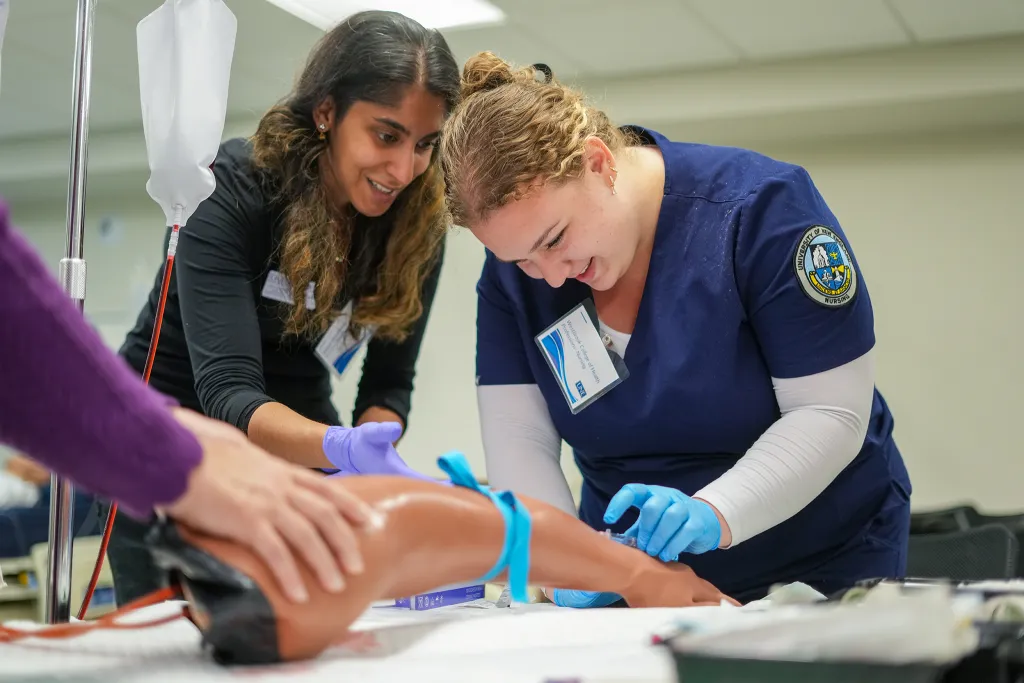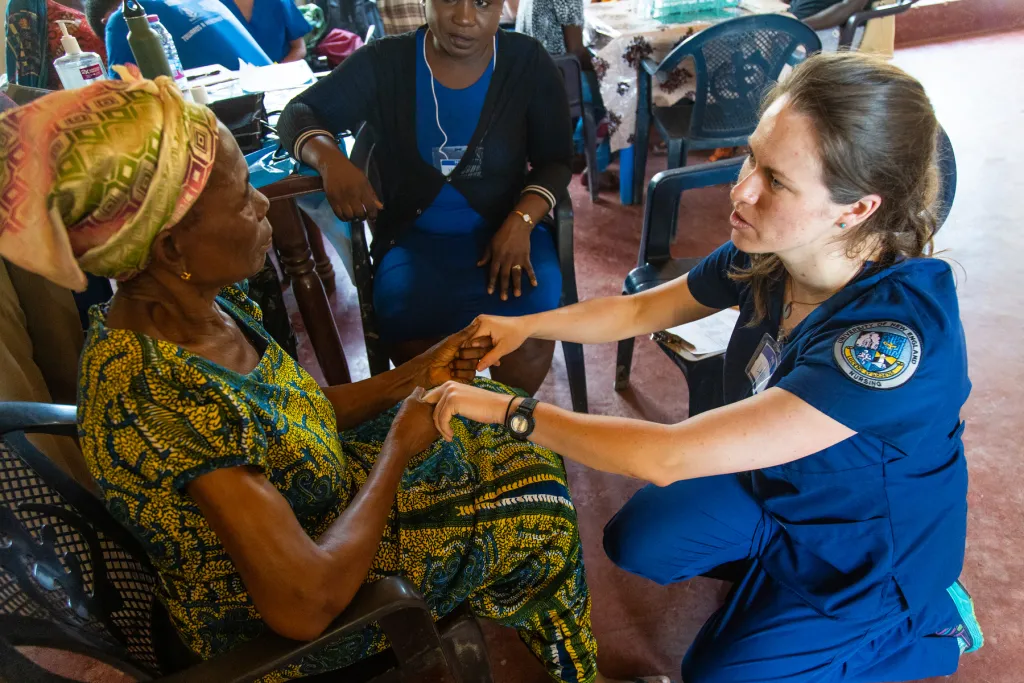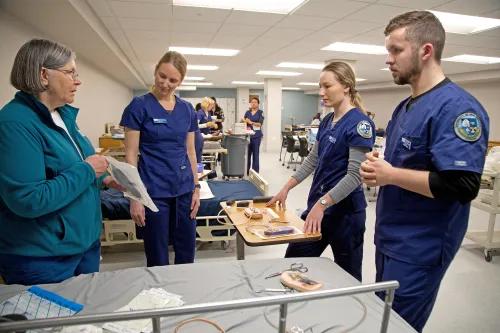Embark on a Nursing Career with UNE’s B.S.N. Program
Become part of the largest and most trusted segment of the health care workforce. At UNE, our nursing instruction utilizes a variety of innovative teaching strategies, including skill-building in a state-of-the-art Simulation and Innovation Center. As a comprehensive health sciences university, we emphasize interprofessional education, so you learn to work as part of a health care team. And with the highest three-year (2021-2023) average for NCLEX-RN first-time pass rates in the state of Maine, we are confident that you will emerge from our program with the training and experience you need to start making a difference in patients’ lives.
of UNE Nursing students pass the NCLEX on the first try
Compared to the State of Maine at 91.98% and nationally at 82.21%
Why UNE for your bachelor of science in Nursing
- Our NCLEX-RN licensing exam pass rate has been above the national average since 2013
- UNE is the #1 Maine University for students getting jobs after graduation — Zippia
- Study for two years on our gorgeous coastal Biddeford Campus, and two years on our in-town Portland Campus for the Health Sciences
- Learn clinical skills in a state-of-the-art, hospital-like simulation lab
- Study abroad at UNE’s Morocco campus, specially designed for health professions students
- Engage in fascinating service learning opportunities in the U.S. and abroad
- Learn with students of other health disciplines, including future doctors, dentists, pharmacists, and others
- Financial Aid, including merit awards
- Already have a bachelor’s? Accelerated 12-month B.S.N. program available
What will you study? B.S. in Nursing Curriculum Overview
As a Nursing student, you will explore the domains of geriatrics, pediatrics, obstetrics, mental health, and more. The following are just some examples of the exciting courses that you will take:
- Adult Health
- Maternal/Child Nursing
- Evidenced-Based Practice
- Health Assessment
- Pharmacology
- Medical Surgical Nursing
- Mental Health Nursing
- Community Health Nursing
- Older Adult Health
- Nursing Leadership
- Transitions to Practice
The School of Nursing is accredited by the Accreditation Commission for Education in Nursing and approved by the Maine State Board of Nursing.
Curriculum
| Nor’easter Core Requirements | Credits |
|---|---|
| Total Credits | 40 |
| Program Required Courses | Credits |
|---|---|
| BIO 104/104L – General Biology w/Lab | 4 – Fulfills Scientific Method Core |
| BIO 208/208L – Intro to A&P I w/Lab | 4 |
| BIO 209/209L– Intro to A&P II w/Lab | 4 |
| BIO 242/242L – Applied Microbiology w/Lab | 4 |
| BIO 309 – Pathophysiology | 3 |
| CHE 130/130L – Principles of Chemistry w/Lab | 4 |
| MAT 120 – Statistics | 3 – Fulfills Quantitative Reasoning Core |
| NUTR 220 – Nutrition | 3 |
| NSG 103 – Essentials in Nursing Knowledge and Practice | 2 |
| NSG 202 – Introduction to Nursing | 3 |
| NSG 307 – Adult Health I/Clin | 6 |
| NSG 315 – Adult Health II/Clin | 7 |
| NSG 327 – Health Assessment | 3 |
| NSG 328 – Mental Health/Clin | 4 |
| NSG 332 – Evidence-Based Practice (EBP) I | 2 |
| NSG 342 – Pharmacology | 3 |
| NSG 351 – Integrating Experience I | 1 |
| NSG 409 – Adult Health IV | 3 |
| NSG 420 – Community and Public Health Nursing | 3 |
| NSG 424 – Maternal/Child/Clin | 8 |
| NSG 432 – Evidence-based Practice (EBP) II | 2 |
| NSG 442 – Integrating Experience III | 1 |
| NSG 445 – Leadership | 2 |
| NSG 447 – Transitions to Practice | 2 |
| NSG 456 – Adult Health III/Clin/Preceptorship | 9 |
| PSY 105 – Intro to Psychology | 3 – Fulfills Human Health Core |
| SOC 150 – Intro to Sociology | 3 – Fulfills Power Knowledge & Justice - Social Science Core |
| Total Credits | 96 |
| Minimum Total Required Credits | 120 |
|---|
Please note: While some courses can fulfill both core and program requirements, the credits earned do not count twice towards the minimum total required credits for the degree.
Graduation Requirements
A student in the four (4) year nursing major may elect to pursue a Bachelor’s Degree with a major in Health Sciences. This degree is only open to matriculated students at the University of New England. Special permission from the student’s advisor, the director of Nursing, and the dean of the Westbrook College of Health Professions is required for enrollment in the B.S. in Nursing.
To learn more about the program see the Academic Catalog.
Learn about UNE’s Nursing Skills Lab
Career Paths for Nursing Majors
Providing a firm liberal arts foundation, UNE’s B.S. in Nursing will help you develop essential critical thinking and communication skills as well as theoretical, evidence-based knowledge of nursing science. And with more than 550 hours of hands-on learning, you will be well on your way to a fulfilling career in professional nursing. As a nurse, you may work in a variety of settings, including:
- Acute care (hospitals)
- Primary care
- Long-term care facilities
- Public and private schools
- Federal, state, and local health departments
- Home health care
- Accountable care organizations
Career Advising in the Nursing Program
Whether you have a specific career goal in mind or a vague idea of the field that interests you, Career Advising is here to help you plan your next step.
Nursing Careers by the Numbers
Expected rate of nursing job growth from 2016 to 2026, with 438,100 new nursing positions
Facilities
Harold Alfond Forum
The Harold Alfond Forum, which opened in 2012, includes a 105,000-square-foot athletics complex featuring: an ice hockey rink with 900 seats; a basketball court with 1,200 seats; classroom space; a fitness center; and multi-purpose indoor practice courts that can also be used for performances and other events, with a combined seating capacity of 3,000.
It also houses the Athletic Training and Applied Exercise Science programs, which have custom-designed teaching and laboratory spaces.
The Interprofessional Simulation and Innovation Center
The Interprofessional Simulation and Innovation Center has a presence on UNE's Portland and Biddeford campuses. In Portland, it occupies two floors in the Blewett Science Building, adjacent to skills laboratories and classrooms. In Biddeford, it has dedicated space in the Harold Alfond Forum. The center offers three simulation labs with adjoining fully-equipped control rooms, a task training lab, and a debriefing classroom. The center also has dedicated space for staff offices, welcoming visitors, and storage. All of the labs are flexible and fully equipped for audiovisual recording, presentations, and debriefing.
Center to Advance Interprofessional Education and Practice
UNE is one of a handful of private universities with a comprehensive health education mission that includes medicine, pharmacy, dental medicine, nursing, and an array of allied health profession programs. In UNE’s social work program, you will take part in interprofessional education initiatives that prepare you to work with other aspiring health professionals to practice comprehensive and collaborative team-based care. Through service-learning and field experiences, you benefit from exercises that also include students from other UNE health discipline programs.
WCHP Office of Service Learning
Service-learning initiatives connect students, faculty, and professional staff with opportunities to engage in meaningful and mutually beneficial service activities within a variety of community settings. Service-learning instills for students a lifelong commitment towards helping others, while positively impacting individual, family, and community health outcomes among populations served. Examples of service-learning include working with the homeless population, implementing health fairs, and developing age-appropriate recreational activities at a local Boys and Girls Club.
Experiential Learning in Nursing
Whether you’re practicing basic skills on fellow nursing students, learning emergency medical techniques with life-like simulation mannequins, or caring for patients in clinical practice settings, in UNE’s B.S. in Nursing program, you’re always learning by doing.
Service Learning
Our Service Learning Program enables you to care for vulnerable populations in our community. You may work with a variety of agencies and nonprofits, including:
- Homeless Health Outreach
- Partners for World Health
- Cumberland County Jail
- Boys and Girls Clubs
- Southern Maine Area Agency on Aging
- Maine Access Immigrant Network
Interprofessional Education
- Prepare for modern, team-based care in UNE’s Center to Advance Interprofessional Education and Practice.
- Work with students in a wide range of different health professions programs to provide quality, patient-centered care.
- Reap the personal and professional benefits of graduating from one of only a handful of private universities with a comprehensive health care mission.
Cross Cultural Health Immersion
- Broaden your worldview and begin the process of becoming a culturally sensitive health professional.
- Evaluate health education curricula relevant to the population need.
- Connect with UNE students from other health professions programs.
Clinical Simulation Program
The Clinical Simulation Program uses high fidelity patient simulators and patient actors to create a wide variety of learning opportunities in realistic settings. You learn to function as an individual and also as a member of an interdisciplinary health care team through these exercises. You face rarely seen cases, hard-to-diagnose cases, and other challenges of the nursing profession in the simulation labs so that when you face them in the field, you will know how to respond.

Clinical Experiences
As a student in our traditional B.S.N. program, during your last four semesters you are deeply immersed in not only nursing coursework but clinical experiences that emphasize clinical judgment, health and human functioning, care and therapeutics, person and environment, and health care resources.
Typically, you spend one or two days per week in one of the area's leading hospitals or in a community setting. The different settings serve diverse populations and allow you to actualize the process of integrating theory and practice. Our clinical partners include New England Rehabilitation Hospital, Maine Medical Center, Southern Maine Medical Center, Midcoast Hospital, and York Hospital. At these locations, you work under the direct supervision of a clinical faculty member in clinical experiences that include medical surgical nursing, gerontology, maternity, pediatrics, and other specialized areas of care.
Global Education in Nursing
See The World
Unlike other nursing programs, we make it possible for you to spend a semester abroad — in fact, we encourage it. Choose from our programs in Morocco or Spain. Both offer lab sciences courses that will keep you on track for your nursing degree. Other short-term immersion experiences are available, including faculty-led trips to places such as the Azores and Panama, and medical mission trips organized by the Pulse Club.
Interested in studying abroad? Make a plan with your advisor.

Tuition Assistance for Nursing Students
UNE is committed to educating students with a range of tuition support needs. The dedication of generous donors allows UNE to offer robust financial aid packages that are distributed upon enrollment in our nursing programs. Scholarships are made possible in part by individuals and organizations in our community who understand the importance of adequate access to quality healthcare in our region.
- Allan H. Saunders Endowed Scholarship
- Barbara J. Kamm, M.S.W., '91 Endowed Scholarship
- Elizabeth Burns Cope '44 Endowed Scholarship
- Joann B. Thomas '81 and '84 B.S.N. Scholarship
- Mabel I. Lalumiere, RN Memorial Scholarship
- McCulloch Family Fund Scholarship
- Nathan M. Desjardins Memorial Scholarship Fund
In addition, UNE has individual scholarships for nursing students that have unique criteria and application processes. These include:
- Barbara J. Kamm, M.S.W., '91 Ghana Health Immersion Scholarship
- The Helene Fuld Health Trust Scholarship for A.B.S.N. students
Accreditation
The University of New England's Nursing Program is accredited by the Accreditation Commission for Education in Nursing (ACEN).
Accreditation Commission for Education in Nursing, Inc.
3390 Peachtree Road NE, Suite 1400
Atlanta, GA 30326
(404) 975-5000
info@acenursing.org
www.acenursing.org
The program has also been approved by the Maine State Board of Nursing.
Apply Today
Ready to begin your future in UNE’s Bachelor of Science in Nursing? Get started today.

B.S.N. Degree FAQ
How long does the B.S.N. program take and where is it located?
It takes four years (eight semesters) to complete UNE’s B.S.N. degree. In the first two years, classes are held on the Biddeford Campus. For the second two years, nursing students move to the Portland Campus as they begin their clinical education.
Is the nursing program accredited?
Yes, the B.S.N. program is accredited by the Accreditation Commission for Education in Nursing and approved by the Maine State Board of Nursing.
What is the NCLEX-RN pass rate at UNE?
The most up-to-date information about UNE graduates’ NCLEX-RN pass rates and employment can be found in the Annual Report for Communities of Interest (PDF).
What are the admission requirements for UNE’s B.S.N. program?
In addition to UNE general admission requirements, you must have taken high school chemistry and biology, two years of high school math, and have a high school GPA of at least 3.2, recalculated for science and math. As a Nursing applicant, you have the option to submit your ACT or SAT scores. Please see our undergraduate admission test policy for more information.
Does the B.S.N. program require pre-admission testing?
No, not at this time.
How do I apply to UNE’s B.S.N. program?
You can apply online using the Common Application or the UNE Application. Both are available on the UNE Admissions webpage. November 15 is the deadline for Early Action. February 15 is the application deadline. After that, applications are accepted on a space-available basis.
Is UNE’s B.S.N. a direct-entry program?
Yes. Once you are admitted as a nursing major at UNE, as long as you continue to meet progression requirements, you are guaranteed a clinical placement.
When will I start clinical nursing experiences?
Clinical coursework as a nursing student at UNE starts in the first semester of your junior year and continues in each semester until graduation.
Where do I go for clinical experiences?
UNE’s clinical partners include local acute care hospitals, community hospitals, rehabilitation hospitals, and community-based clinics, such as those in schools, and others.
Will I need a car as a Nursing student at UNE?
During the first two years, while you are living on the Biddeford Campus, you will not need a car. As part of UNE’s Green Initiative, you are encouraged to use campus bicycles, local buses, and shuttles. In your junior and senior years, nursing students are responsible for transportation to clinical sites. Carpooling is encouraged.
Will I be able to play a sport while I study Nursing at UNE?
Nursing coursework will take a lot of your time, but UNE’s Athletics Department and the Department of Nursing work together to support student athletes who want to continue their sport for all four years.
What opportunities can I expect as a UNE B.S.N. student?
- Clinical Simulation Experiences, allowing students to safely practice patient care in state-of-the-art Simulation Labs.
- Interprofessional Education as value-added content. Starting with your first class in the Westbrook College of Health Professions, you will learn and work with other members of the health care team, building skills you will use every day in your own practice. On the Portland Campus students have the opportunity for case-based learning with other health professions.
- Service Learning Programs. Work with other UNE students and faculty on community-based service teams in local shelters, county jail projects, immigrant community centers, rural Maine immersions and other locations.
- Study Abroad Opportunities. B.S.N. students can spend the fall of their sophomore year in Morocco or Spain without interrupting progress toward their degree. A cross-cultural immersion program in Ghana, West Africa, is available for junior and senior students.
- Professional Involvement from day one. The UNE Student Nurse Association is affiliated with the National Student Nurse Association. Be a member, run for office, organize service activities, or attend a national conference.
How will I be supported in adjusting to college life at UNE?
UNE provides a First-Year Experience course that helps students navigate all available resources as well as develop study skills and manage time.
